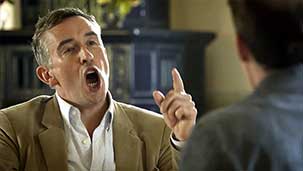Dear Fellow Critics,
*As you know, picking a best film of the year is a special sort of ethical dilemma. Your selection doesn’t just define your aesthetic tastes, but who you are as a person at that particular moment in time (if I was writing this essay in 1996, you’d be hearing all about the hyperkinetic genius of Michael Bay’s The Rock). *
If you take the process of annointing a “best film” seriously (and you half-should), you have to make some important decisions about how you approach the act of criticism itself. Is the best film your favorite film? The film that you enjoyed the most, that seemed to speak most directly to your experience, your worldview, your personal tastes? Or is it the film that, in some explicit and objective way, best exemplifies the potential of cinema as an art form? Something empirically superior? If you’re lucky, you’ve seen a film that represents some amalgamation of those two noble goals. Otherwise, you’re making an objective judgment of something inextricably subjective.
Ultimately, how you choose your favorites says a lot about how you watch films. I have no pretensions of being an exhaustive, scholarly filmgoer (not like I did back in 1996). Frankly, I lack the Lou Bloom-like dedication of some people. I must rely on my instincts, and my instincts are guided by that fundamental principle of art: to alter the way we see the world. In 2014, there was a film that made me reconsider the way I see the world, the way I live my life, and the way I distinguish between Welsh and Scottish James Bonds. And that film was Michael Winterbottom’s The Trip to Italy.
Much of what affected me about the film has to do with my fond feelings for the first installment: Coogan and Brydon cruising through Northern England, bickering, debating, the former perpetually annoyed, that latter perpetually eager. Coogan has a series of affairs, but can never quite find the contentment that Brydon and his young family possess. Brydon, on the other hand, doesn’t have Coogan’s ambitions, and has achieved only a fraction of his success.
Here, in the sequel, Coogan is a bit more stable (he has a regular TV gig), and Brydon’s ambitions have expanded (he’s auditioning for a role in a Michael Mann film). Which is perhaps what makes The Trip To Italy so fascinating to me. It’s an experiment in character building; take two established characters, switch their circumstances, stand back and see how they react.
Coogan and Brydon are playing versions of themselves, sure, but it’s not quite the same trick that the gang in This Is The End plays. These colorful caricatures are sketched against a plain white background. The semi-documentary style employed by Winterbottom is more than just the same stylistic conceit adopted by modern sitcoms and found footage flicks. It manages to fix the characters in a real and recognizable world while also amplifying their comedic eccentricities. The way the story resolves – by not quite resolving at all – is indicative of the film’s non-traditional narrative structure. The sweet conclusion of Coogan’s paternal about-face, and the ambiguity of how Brydon will deal with his compromised morals, is a perfect ending, and deeply affecting to anyone who has gained an affinity for these two men over the course of two films.
In the ruins of Pompeii, when Coogan – who throughout both films demonstrates a spiritual allergy to notions of death and mortality – gets his hackles up at Brydon’s fun-making at the expense of a thousand year-old corpse is both funny and poignant and speaks simply to big ideas of impermanence and empathy. Sure, those are the same big ideas that other important films of 2014 addressed. But no other film addressed them with such subversive ease.
Yes, the formula is simple. Two actors playing lightly fictionalized version of themselves, let loose to improvise about squabbling movie stars and obscure British chat show hosts. Some might argue that in a year of decades-in-the-making passion projects and dark dissertations on the state of the American soul a film about two blokes conversing over dinner and wine is too unambitious, too ordinary to be the best film of the year. But no one discounts the power of a film like My Dinner With Andre for modesty of scope. Nor should you discount The Trip To Italy, which is the best (aka. my favorite) film of 2014.
Sincerely,

Jared




